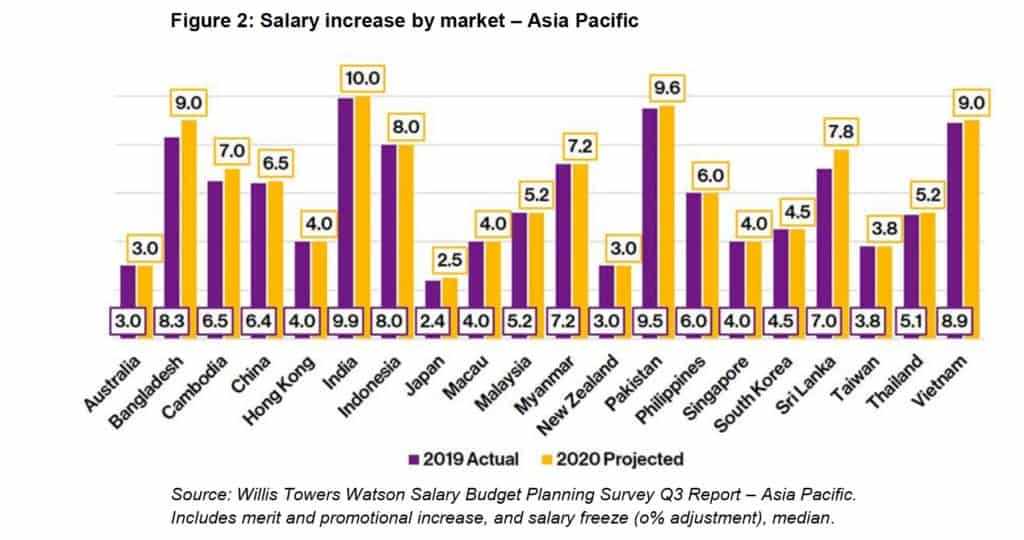Companies in most Asia Pacific markets are conservative in setting their salary increase budgets for 2020, said advisory firm Willis Towers Watson recently.
Only nine out of 20 markets in WTW’s Q3 survey plan to have a higher salary budget in 2020, the company pointed out.
These countries include Bangladesh, Cambodia, China, India, Japan, Pakistan, Sri Lanka, Thailand and Vietnam, it added.
WTW’s Q3 survey was conducted in July 2019 with 4,521 sets of responses received from 1,128 companies across 20 markets in Asia Pacific.
Early projections indicate that salary movements will remain unchanged for the rest of the markets, including Australia, Hong Kong, Indonesia, Macau, Malaysia, Myanmar, New Zealand, Philippines, Singapore, South Korea and Taiwan, WTW noted.

Recruitment efforts to slow
In addition, recruitment efforts are expected to slow down over the next 12 to 24 months as businesses are cautious.
Survey results show that only 22% of Asia Pacific organisations plan to add new headcount compared to 27% last year, WTW said.
Organizations planning to maintain their current headcount increased from 66% in 2018 to 72% in 2019.
As with the previous year, only 7% of respondents plan to reduce their headcount.
“We are seeing a change in employment trends which indicates that more organizations are beginning to optimize work through upskilling, automation and outsourcing,” said Edward Hsu, Business Leader, Data Services and Compensation Software, Asia Pacific, Willis Towers Watson.
Over the years, WTW’s survey also found a drop in voluntary attrition rates across the region, from 14.3% in 2017 to 10.4% last year, likely due to the global economic uncertainty, Hsu added.
On the contrary, we are seeing an increase in involuntary attrition, rising from 3.6% in 2017 to 4.0% in 2018, he observed.
Companies in the manufacturing, energy and natural resources, and pharmaceuticals and healthsSciences industries have the highest involuntary attrition rate in the region, Hsu pointed out.
The expansion of workplace automation in these industries has changed the mix of talent pools being used as employers tend to add more non-employee talent to their workforces, reducing their reliance on full-time employees, he said.
Nevertheless, companies still need to ensure the optimal combination of humans and automation as they reinvent their jobs, Hsu added.
The three industries that will stay ahead in salary increase
Fintech, high tech, pharmaceutical and health sciences stay ahead in salary increase while banking continues to lag behind, according to the survey.
The survey also found that employers in the Fintech industry in China, Hong Kong and Singapore are planning to increase their salary budget by up to 2.1% next year on average, the highest jump among all industries (6.2% in 2020 versus 4.1% in 2019), WTW said.
The high tech industry in Asia Pacific is also projecting one of the highest salary increases next year (5.8% in 2020 versus 5.7% in 2019), the firm noted.
In addition, the pharmaceutical and health sciences industry continues to show strong growth with 42% of the companies expecting a better outlook in business performance next year, WTW said.
Employers in this industry are projecting a salary budget increase of 5.9% for next year, a 0.2% increase from 2019, it added.
Salary increase budgets in the banking industry are the lowest and expected to remain stable at 4.7% next year, according to survey results.




